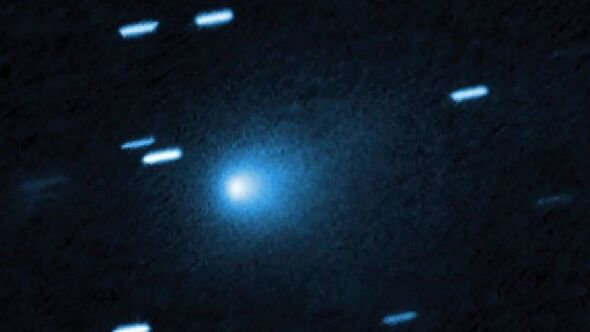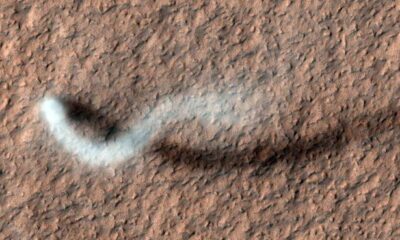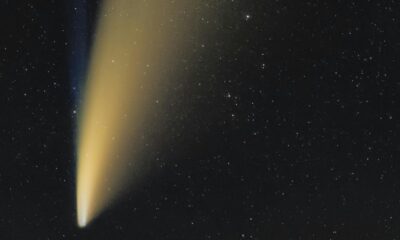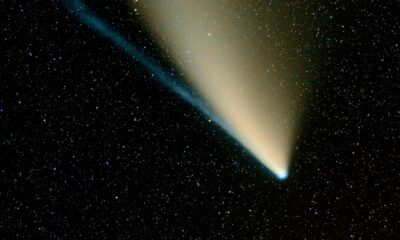Science
NASA Scientist Reveals Potential for Life on Dwarf Planet Ceres

A NASA scientist has put forth compelling evidence suggesting the possibility of life existing on the dwarf planet Ceres. Dr. David Grinspoon, an astrobiologist with NASA, indicated that recent findings from explorations of Ceres have exceeded initial expectations regarding its potential to harbor life.
Ceres, the largest object in the asteroid belt located between Mars and Jupiter, may still contain liquid water beneath its surface, which could create conditions suitable for life. Grinspoon shared insights during an interview with WIRED, noting that “recently we sent a spacecraft there and found some surprising things.”
Explorations Yield Surprising Discoveries
One of the most striking discoveries was a bright flash of white on Ceres, identified as a salt deposit. This finding implies that the dwarf planet once had liquid water, potentially with a salty composition similar to Earth’s oceans. Grinspoon elaborated on the significance of these findings, stating, “The most interesting thing was a crater, and what we found is that it is a salt deposit, which indicates that there was water on the planet.”
The implications of this discovery are profound. According to Grinspoon, the evidence suggests that Ceres may have once been a “water world” and could still possess liquid water today. He remarked, “This is very exciting to astrobiologists because it means that dwarf planets like Ceres are places where you could have had habitable conditions on the inside.”
Ongoing Exploration and Future Possibilities
The enthusiasm surrounding these findings is palpable, with Grinspoon asserting that the exploration of our solar system continues to yield unexpected results. He stated, “The more we explore the solar system, the more we’re surprised by the level of activity on some of these worlds that we thought were dead.” This ongoing research underscores the necessity of water as a prerequisite for life, a fact that scientists are increasingly confirming.
Grinspoon further noted that there is a possibility for current life-sustaining conditions on Ceres, suggesting, “Who knows, maybe at present some of these planets still have habitable oceans.”
The discoveries surrounding Ceres have sparked considerable interest in astrobiology, as researchers continue to investigate the fundamental building blocks of life. Grinspoon emphasized that experiments show these building blocks can easily be created under various conditions.
The findings on Ceres, often referred to as a site of “alien mystery lights,” have now been clarified as salt deposits, enhancing our understanding of this enigmatic dwarf planet. As exploration continues, the potential for discovering life beyond Earth remains an exciting frontier for scientists and enthusiasts alike.
-

 Entertainment3 months ago
Entertainment3 months agoAnn Ming Reflects on ITV’s ‘I Fought the Law’ Drama
-

 Entertainment4 months ago
Entertainment4 months agoKate Garraway Sells £2 Million Home Amid Financial Struggles
-

 Health3 months ago
Health3 months agoKatie Price Faces New Health Concerns After Cancer Symptoms Resurface
-

 Entertainment3 months ago
Entertainment3 months agoCoronation Street’s Carl Webster Faces Trouble with New Affairs
-

 Entertainment2 weeks ago
Entertainment2 weeks agoCoronation Street Fans React as Todd Faces Heartbreaking Choice
-

 Entertainment3 months ago
Entertainment3 months agoWhere is Tinder Swindler Simon Leviev? Latest Updates Revealed
-

 World2 weeks ago
World2 weeks agoBailey Announces Heartbreaking Split from Rebecca After Reunion
-

 Entertainment4 months ago
Entertainment4 months agoMarkiplier Addresses AI Controversy During Livestream Response
-

 Science1 month ago
Science1 month agoBrian Cox Addresses Claims of Alien Probe in 3I/ATLAS Discovery
-

 Health5 months ago
Health5 months agoCarol Vorderman Reflects on Health Scare and Family Support
-

 Entertainment4 months ago
Entertainment4 months agoKim Cattrall Posts Cryptic Message After HBO’s Sequel Cancellation
-

 Entertainment3 months ago
Entertainment3 months agoOlivia Attwood Opens Up About Fallout with Former Best Friend




















